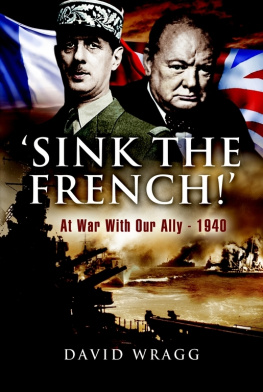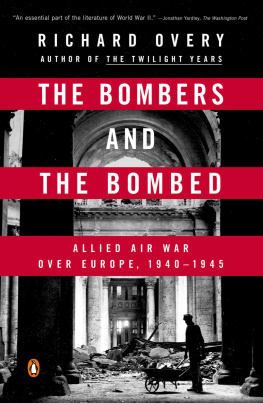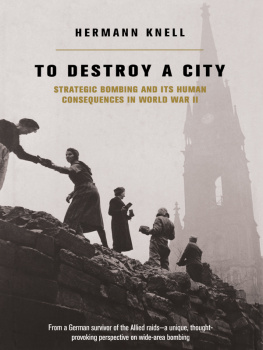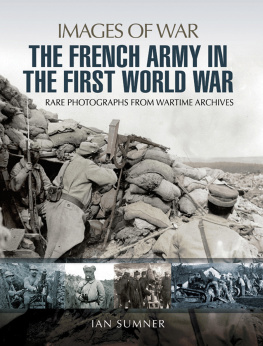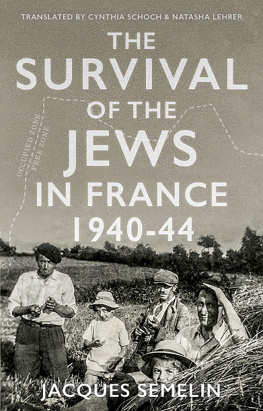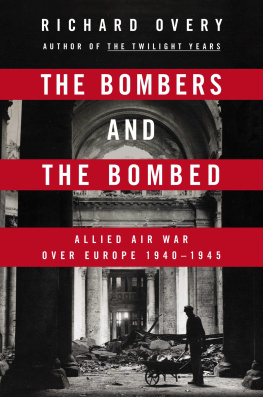French children under the Allied bombs, 194045
Cultural History of Modern War
Series editors
Ana Carden-Coyne, Peter Gatrell, Max Jones, Penny Summerfield and Bertrand Taithe
Already published
Carol Acton and Jane PotterWorking in a world of hurt: trauma and resilience in the narratives of medical personnel in warzones
Julie AndersonWar, disability and rehabilitation in Britain: soul of a nation
Rachel DuffettThestomach for fighting: food and the soldiers of the First World War
Christine E. HallettContaining trauma: nursing work in the First World War
Jo LaycockImagining Armenia: Orientalism, ambiguity and intervention
Chris MillingtonFrom victory to Vichy: veterans in inter-war France
Juliette PattinsonBehind enemy lines: gender, passing and the Special Operations Executive in the Second World War
Chris PearsonMobilizing nature: The environmental history of war and militarization in Modern France
Jeffrey S. ReznickHealing the nation: soldiers and the culture of caregiving in Britain during the Great War
Jeffrey S. ReznickJohn Galsworthy and disabled soldiers of the Great War: with an illustrated selection of his writings
Michael RoperThe secret battle: emotional survival in the Great War
Trudi Tate and Kate Kennedy (eds.)The silent morning: culture and memory after the Armistice
Penny Summerfield and Corinna Peniston-BirdContesting home defence: men, women and the Home Guard in the Second World War
Wendy UgoliniExperiencing war as the enemy other: Italian Scottish experience in World War II
Laura UgoliniCivvies: middle-class men on the English Home Front, 191418
Colette WilsonParis and the Commune, 187178: the politics of forgetting
Series logo Centre for the Cultural History of War
http://www.arts.manchester.ac.uk/subjectareas/history/research/cchw/
French children under the Allied bombs, 194045
An oral history
LINDSEY DODD
Manchester University Press
Copyright Lindsey Dodd 2016
The right of Lindsey Dodd to be identified as the author of this work has been asserted by her in accordance with the Copyright, Designs and Patents Act 1988.
BBC copyright material reproduced courtesy of the British Broadcasting Corporation. All rights reserved.
Published by Manchester University Press
Altrincham Street, Manchester M1 7JA
www.manchesteruniversitypress.co.uk
British Library Cataloguing-in-Publication Data
A catalogue record for this book is available from the British Library
Library of Congress Cataloging-in-Publication Data applied for
ISBN 978 0 7190 9704 1 hardback
First published 2016
The publisher has no responsibility for the persistence or accuracy of URLs for any external or third-party internet websites referred to in this book, and does not guarantee that any content on such websites is, or will remain, accurate or appropriate.
Typeset by Out of House Publishing
Contents
I would like to thank all of the institutions and individuals who have made the writing and the publication of this book possible.
Without the interviewees, who so generously allowed me to come to their homes and shared their memories with me, this research would not have been possible. I hope that, despite the linguistic boundary that comes from publishing in English, this is, to some extent, their book too. I will not thank each by name here. However, I am indebted to them, and have happy memories of the hours I spent in their houses, where they gave me a stronger sense of the value of this research with every cup of coffee and every biscuit offered: their stories matter, and it mattered to them that I wanted to listen.
Some of these interviewees have sadly passed away since I conducted this research. Some relatives have contacted me to say how pleased they are to have their stories, recorded and given back on CDs. I received an email in February 2012 from a relative of one interviewee telling me that his father-in-law
had a fond memory of your visit, and he mentioned you from time to time. He is now sharing that memory with other members of our family who were present of the time of that air raid [in March 1942]. You can be sure that you have a warm supporter watching over you from beyond.
This gives some indication of the value of doing research into the lives of ordinary people, not only for historians trying to understand the complexity of the past, but for those who lived through it and their families.
My doctoral research, on which this book is based, was funded by the Arts and Humanities Research Council as part of a project which ran between 2007 and 2010: Bombing, States and People in Western Europe, 19401945. I am enormously grateful for the many opportunities this funding brought. I would like to thank all members of the project team, particularly Richard Overy, Andrew Knapp, Claudia Baldoli and Marc Wiggam. I was lucky to work with such a creative and talented group of scholars as part of my induction into this profession.
I could not have asked for a better PhD supervisor than Andrew Knapp, whose support, encouragement and enthusiasm still endure, as well as his faith in my ability and my methods. I learnt an enormous amount from him, and am also very grateful for the generosity with which he shared his own research with me. I owe my second supervisor Martin Parsons a great deal too; his insistent advocacy for the plight of children in war introduced me to this important area of research, in which I continue to work. I would also like to thank Robert Gildea and Hilary Footitt, who examined my thesis and gave me the confidence to believe that it was publishable.
I thank the Department of French Studies at the University of Reading, where I spent three happy years conducting this research, as well as the History subject area in the School of Music, Humanities and Media at the University of Huddersfield, where I have worked since 2012. My colleagues are dedicated and impressive in so many ways, and I have learnt a lot from them all. I should also make mention of the enthusiasm of the undergraduates I have been teaching at Huddersfield who make this job much more enjoyable.
My interest in the Vichy era began during my A-Levels through the wonderful teaching of Sylvia Mills at Charters School. This accounted in part for my choice of the University of Sussex for my undergraduate degree, where, like so many others, I was inspired by Rod Kedwards Fall of France module. While writing my undergraduate dissertation on the cole Nationale des Cadres dUriage, I became intrigued by the complexity of oral evidence, and as a result took the MA in Life History Research: Oral History and Mass-Observation at the University of Sussex. Under the dynamic supervision of Al Thomson and Dorothy Sheridan, I developed a genuine excitement for the subtlety, warmth, depth and scope of oral history.


